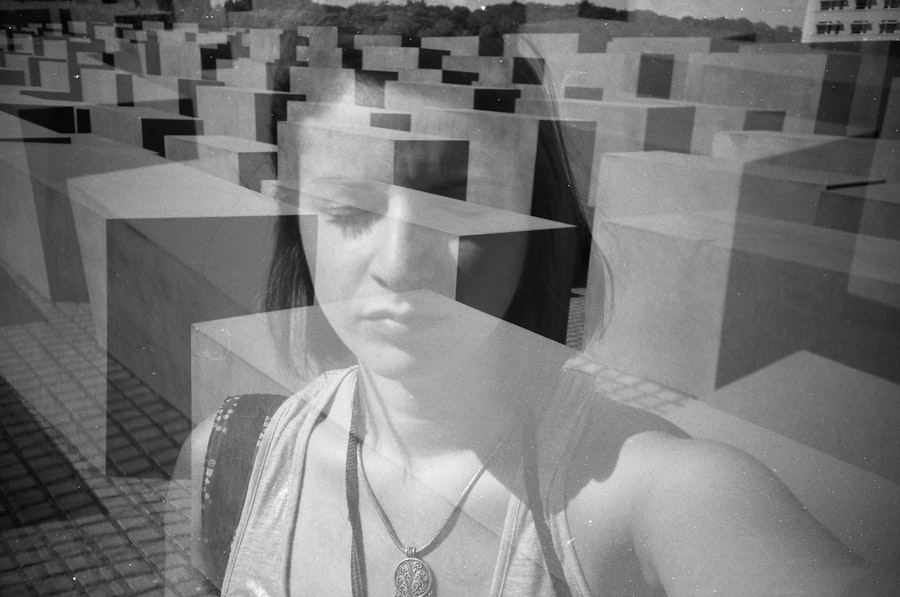Depersonalization Derealization Disorder (DPDR) is a complex mental health condition that can leave you feeling detached from your own thoughts, feelings, and sense of self. Imagine waking up one day and feeling as if you are observing your life from a distance, as if you are merely a spectator in your own existence. This sensation can be disorienting and frightening, often leading to confusion about your identity and reality.
DPDR is characterized by persistent or recurrent experiences of depersonalization—feeling disconnected from your body or thoughts—and derealization, where the world around you seems unreal or distorted. The disorder can manifest in various ways, and it often occurs in response to extreme stress, trauma, or anxiety. You might find yourself questioning whether you are truly present in your life or if everything around you is just a figment of your imagination.
While many people experience fleeting moments of depersonalization or derealization, those with DPDR endure these feelings consistently, which can significantly impact their daily functioning and overall quality of life. Understanding this disorder is crucial for recognizing its effects and seeking appropriate support.
Key Takeaways
- Depersonalization Derealization Disorder is a mental health condition characterized by feeling detached from oneself and the world around them.
- Signs and symptoms of Depersonalization Derealization Disorder include feeling like an outside observer of one’s thoughts and actions, emotional numbness, and distorted perception of time and space.
- Finding support is crucial for individuals with Depersonalization Derealization Disorder, as it can help them feel less isolated and provide validation for their experiences.
- Joining a Depersonalization Derealization forum can provide a sense of community, shared experiences, and coping strategies for individuals with the disorder.
- Understanding and coping with Depersonalization Derealization Disorder involves self-care, therapy, and finding healthy coping mechanisms to manage symptoms.
Signs and Symptoms of Depersonalization Derealization Disorder
Recognizing the signs and symptoms of DPDR can be the first step toward understanding your experience. You may frequently feel as though you are observing yourself from outside your body, as if you are watching a movie of your life rather than living it. This sensation can lead to feelings of emptiness or numbness, making it difficult to connect with your emotions or the people around you.
You might also experience a sense of unreality regarding your surroundings, where familiar places seem strange or distorted, contributing to a profound sense of disconnection. In addition to these core symptoms, you may notice other manifestations such as difficulty concentrating, memory problems, or a general sense of anxiety and unease. These symptoms can be exacerbated by stress or fatigue, making it essential to pay attention to your mental state.
It’s not uncommon for individuals with DPDR to feel isolated or misunderstood, as the experiences can be challenging to articulate to others. Recognizing these signs in yourself is vital for seeking help and finding ways to cope with the disorder.
The Importance of Finding Support

Finding support when dealing with DPDR is crucial for your mental well-being. The feelings of detachment and unreality can be isolating, leading you to believe that no one else understands what you are going through. However, connecting with others who share similar experiences can provide comfort and validation.
Support can come from various sources, including friends, family, support groups, or mental health professionals who specialize in dissociative disorders. Having a support system allows you to express your feelings and fears without judgment. It creates a safe space where you can share your experiences and learn from others who have faced similar challenges.
This connection can help alleviate feelings of loneliness and provide practical coping strategies that have worked for others. Remember that seeking support is not a sign of weakness; rather, it is an essential step toward healing and regaining a sense of control over your life.
Benefits of Joining a Depersonalization Derealization Forum
| Benefits of Joining a Depersonalization Derealization Forum |
|---|
| 1. Access to Supportive Community |
| 2. Sharing Experiences and Coping Strategies |
| 3. Learning from Others’ Recovery Journeys |
| 4. Access to Resources and Information |
| 5. Feeling Less Alone in the Experience |
| 6. Opportunity to Provide Support to Others |
Joining a forum dedicated to depersonalization and derealization can be an invaluable resource for you. These online communities offer a platform where individuals experiencing similar symptoms can come together to share their stories, insights, and coping strategies. Engaging in discussions with others who truly understand what you are going through can foster a sense of belonging and reduce feelings of isolation.
In these forums, you can find a wealth of information about the disorder, including personal anecdotes about what has helped others manage their symptoms. You may discover new techniques for grounding yourself in reality or learn about therapeutic approaches that have proven effective for others. Additionally, these forums often provide a space for emotional support, allowing you to express your fears and frustrations in a non-judgmental environment.
The collective wisdom of the community can empower you on your journey toward understanding and coping with DPDR.
Understanding and Coping with Depersonalization Derealization Disorder
Understanding DPDR is essential for developing effective coping strategies. You may find it helpful to educate yourself about the disorder, its causes, and its symptoms. Knowledge can empower you to recognize when you are experiencing episodes of depersonalization or derealization and help you differentiate between these experiences and other mental health issues.
This understanding can also reduce the fear associated with these sensations, allowing you to approach them with curiosity rather than panic. Coping with DPDR often involves implementing grounding techniques that help anchor you in the present moment. These techniques may include mindfulness exercises, deep breathing, or engaging in physical activities that connect you with your body.
Remember that coping is a personal journey; what works for one person may not work for another, so be patient with yourself as you explore different strategies.
Tips for Supporting a Loved One with Depersonalization Derealization Disorder

If someone close to you is experiencing DPDR, offering support can make a significant difference in their journey toward healing. One of the most important things you can do is listen without judgment. Allow them to express their feelings and experiences openly, validating their emotions rather than dismissing them as irrational or exaggerated.
Your willingness to listen can create a safe space for them to share their struggles. Encouraging them to seek professional help is also crucial. While your support is invaluable, mental health professionals have the training and expertise necessary to provide appropriate treatment options.
You might offer to help them research therapists who specialize in dissociative disorders or accompany them to appointments if they feel comfortable with that. Additionally, educating yourself about DPDR can enhance your ability to empathize with their experiences and provide informed support.
Seeking Professional Help for Depersonalization Derealization Disorder
Seeking professional help is an essential step in managing DPDR effectively. Mental health professionals can offer various therapeutic approaches tailored to your specific needs. Cognitive-behavioral therapy (CBT) is one common method used to address the thought patterns associated with depersonalization and derealization.
Through CBT, you can learn to challenge negative thoughts and develop healthier coping mechanisms. In some cases, medication may also be considered as part of a comprehensive treatment plan. While there is no specific medication approved solely for DPDR, certain antidepressants or anti-anxiety medications may help alleviate symptoms associated with the disorder.
It’s important to work closely with a healthcare provider to determine the best course of action for your situation. Remember that seeking help is a sign of strength; taking this step demonstrates your commitment to improving your mental health.
Resources for Finding Support and Understanding
There are numerous resources available for individuals seeking support and understanding regarding DPDR. Online platforms such as mental health websites often provide valuable information about the disorder, including articles, videos, and forums where individuals can connect with others facing similar challenges. Additionally, local mental health organizations may offer support groups specifically focused on dissociative disorders.
Books written by mental health professionals or individuals who have experienced DPDR can also provide insight and guidance on navigating the complexities of the disorder. These resources can serve as tools for education and empowerment as you work toward understanding your experiences better. Remember that you are not alone in this journey; there are many avenues available for finding support and fostering resilience in the face of DPDR.
In exploring the complexities of depersonalization and derealization, it’s essential to engage with communities and resources that offer support and understanding. One such resource is the depersonalization derealization forum, where individuals can share their experiences and coping strategies.




